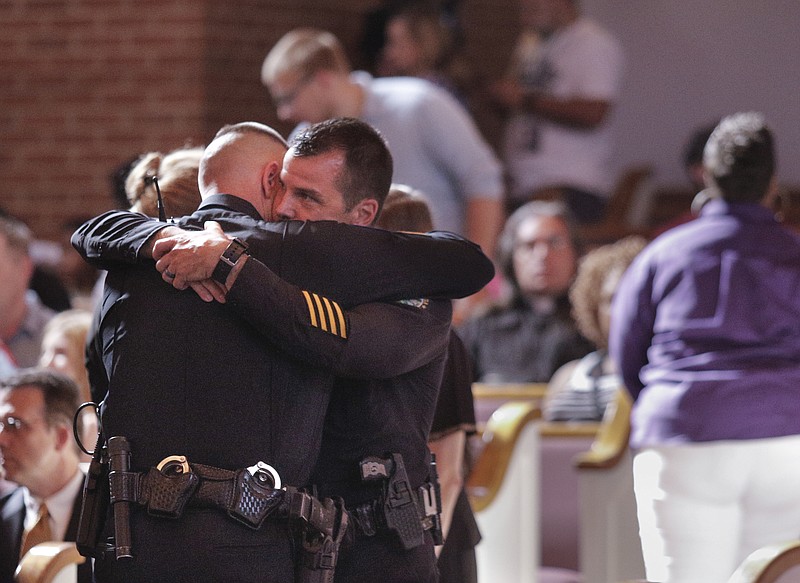The city of Chattanooga says it wants your input about its next police chief.
We hope the request is serious and not just the public relations side of a hiring decision that's already been made.
If you pay attention to these things, you already know the rumors. Police Chief of Staff David Roddy is the man the city wants, the guy current Chief Fred Fletcher recommends and the one most of the rank-and-file officers are behind.
All of that may be true, and he may be the very best candidate. Or it may not be true, and he may not be the best candidate.
But if the city is going to go so far as to put together a committee to consider Fletcher's replacement and to create an online survey for citizens to respond to, it should look seriously at several candidates and thoughtfully digest public input on the issue.
Mayor Andy Berke seemingly tried to tick off all of the boxes in selecting committee members. Three members are from the law enforcement/judicial ranks, former Hamilton County District Attorney General Bill Cox, former United States Attorney Bill Killian and Hamilton County General Sessions Judge Christie Sell. One is a pastor, Ternae Jordan of Mount Canaan Baptist Church. One is a former neighborhood association chairwoman of a diverse community, Olga de Klein. And one, Chris Ramsey, is chief executive officer of TechTown, which might be said to represent the young, entrepreneurial and technological business push in the city.
Four members of the committee are white; two are black. That approximates the 58 percent white/34.9 black split in the city's 2010 census.
Now, the NAACP says it wants a seat at the table "to make sure the black community's voice is heard loud and clear through this selection process," according to local organization president Dr. Elenora Woods. "We don't feel that right now there is going to be a fair process."
That's a lot to unpack.
If by a "fair process" Woods is suggesting the rumors are true and Roddy is a shoo-in, we agree with her. Again, he may be the best candidate, but allow the committee to examine the situation thoroughly.
If by a "fair process" she believes the process inherently would be unfair without the NAACP, we disagree with her. The black citizens of Chattanooga are not so monolithic that they may be spoken for in one voice.
And what of Jordan and Ramsey, the two black members of the committee, one the head of a large, influential church and the other seemingly representative of a younger generation? Couldn't their diverse voices - even among black citizens - fairly represent "the black community"?
Berke is to meet with members of the local NAACP today.
As to the survey, it asks respondents to rank in order five issues the new chief should concentrate on. The issues are reducing property crime, building relationships with neighborhoods, increasing training for officers, reducing violent crimes like assaults, shootings and sexual assaults, and reducing domestic violence.
Should any of those issues not be important to the next chief? We don't believe much can be mined from this preference list.
If your house recently has been burglarized, you'd choose property crime. If you've experienced violent crime, that would be your top preference. If you're a victim of domestic violence, that's what you'd choose to keep it from happening to someone else.
Building relationships with neighborhoods and increasing training for officers? Those should be ongoing.
Similarly, though the survey isn't clear in its instructions, it asks respondents to rank the qualities most important for the chief to have. Honesty, determination, attention to detail, resourcefulness and dedication to service are listed, and respondents can click on one of five boxes (from one to five in importance, we assume).
We want our next police chief to have all of those qualities; indeed, it's unacceptable that he or she would not. Asking him or her to place determination ahead of resourcefulness or dedication ahead of honesty are false choices.
The survey also asks respondents to list questions the search committee should ask candidates. Now we're getting somewhere.
We have a few:
- What new and innovative steps will you take to combat gang violence?
- What parts of the mayor's Violence Reduction Initiative should be retained and which discarded?
- What can be done to weed out "bad seeds" on the police force before they become a problem?
- Is there ground to be gained by meeting with the district attorney to see if different procedures on the law enforcement end can lead to more convictions on the judicial end?
- If you are selected, are you willing to stay on the job more than three years?
We know diverse members of our diverse community will have more questions. We hope they ask them, and we hope the committee considers them. One of the most critical hires in the city is about to be made, and it's important we get it right.
